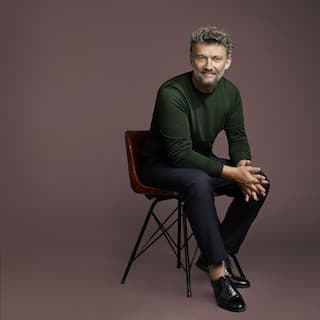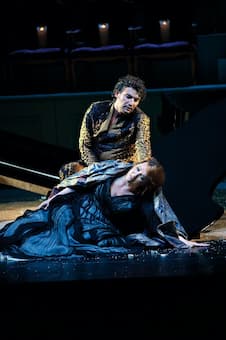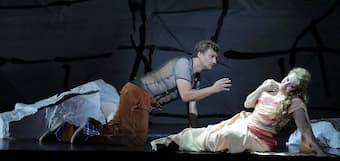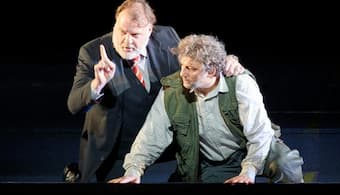
Jonas Kaufmann © Gregor Hohenberg / Sony Music
Described as “the hottest tenor in the world,” Jonas Kaufmann is constantly trying to live down the “greatest living tenor hype.” While the tabloid press focuses on his physical attributes and his earlier supposed liaison with Madonna, Kaufmann has a deep commitment to opera. “Sometimes I wish,” he explains “that people would realize just how important opera is.” In fact, during the ongoing corona pandemic, he has started a petition with his baritone colleague Ludovic Tézier in support of those working in the performing arts. The petitions call for a Europe which meets its duty to preserve the most beautiful legacy of its own civilization: Art. The aim is to put pressure on political leaders, to preserve “what is the essence of our society.” Kaufmann believes that the musical world is facing a dire situation. As he explains, “If we don’t have support, why would young people choose to become musicians? People must show that culture and art are essential. If young people think society will not support them if times are bad, I am worried that there will be no singers. The future is being decided now.”
Jonas Kaufmann Sings “Dio! Mi potevi scagliar,” from Verdi’s Otello

Kaufmann in Ariadne auf Naxos
(Salzburger Festspiele 2012)
Kaufmann was born on 10 July in Munich into a musical family that had fled East Germany in the 1960s. His father worked for an insurance company, and his mother was a kindergarten teacher. Classical music was central to his upbringing, and he studied piano and sang in school choirs as a child. Originally, Kaufmann intended to study for a mathematics degree at the university, but he began his vocal training at the University of Music and Performing Arts in Munich in 1989 instead. During his days of study, he sang small roles at the Bavarian State Opera, and he graduated with distinction in both opera and concert performances in 1994. Kaufmann recalls, “I had a very light, white instruments. I tried to be bright and very flexible with a very high-sitting tessitura. That’s the way I was trained to sing, but I never had a reliable instrument. It was always very fragile, and every little thing immediately ended in cancellation.” Kaufmann, with the help of American singing coach Michael Rhodes, began to unlock his “dark, baritonal tenor.”
Jonas Kaufmann Sings German arias

Kaufmann in Parsifal
Kaufmann wrote that Rhodes “showed me a different way of singing. At first, it was very difficult and it had many downsides, but I knew even then that this was the right way because I could sing on and on and would never get tired. This was a sensation I’d never had before, so I stuck with it and refined it. It was like learning to drive a second time. That was the beginning of the real career.” Kaufmann never aimed to copy Pavarotti, as “he was unique, he was a machine. He had a technique of his own and a voice of his own.” Instead, Kaufmann compares himself to Franco Corelli, the famed Italian tenor with electrifying top notes, clear timbre, passionate singing style, handsome features and a charismatic stage presence. Kaufmann explains that in the beginning, “the darkness of my voice was controversial, and many people counseled me it was wrong for this repertoire, and that I shouldn’t do it. Gradually, however, it somehow got more and more accepted.” His professional career properly took off at the Staatstheater Saarbrücken in 1994, quickly followed by engagements at the Stuttgart and Hamburg Opera and the Lyric Opera of Chicago, Opéra National de Paris, and La Scala. Kaufmann made his Salzburg Festival debut in 1999 in a production of Busoni’s Faust.
Kaufmann Sings “Toi! Vous! Oui, c’est moi” from Massenet’s Manon

Kaufmann in Peter Grimes
His sensational debut at the Metropolitan Opera in New York in 2006 propelled Kaufmann to international stardom. He has been in high demand around the world ever since, particularly so, as he is equally comfortable with Italian, French and German repertoires. He sung Verdi’s Otello in London and Munich, Massenet’s Werther in Paris, Vienna and New York, Wagner’s Lohengrin in Bayreuth, at La Scala and in Paris. Kaufmann has an exclusive contract with Sony Music, and his recording has garnered countless awards. In addition, he has been voted “Singer of the Year” by various specialist journals and juries. High professional praise aside, Kaufmann received the nicest compliment ever from Marilyn Horne, who said, “You have a voice like a cello.”
To be sure, Kaufmann has mastered the entire scale of the tenor repertoire and attaches great importance to a varied repertoire that keeps him flexible in every respect: vocally, musically, stylistically and linguistically. For Kaufmann, “singing is something very subjective as everyone wants and hears something different. Perfection is not what a musician is looking for: I’m looking for emotion. Music is a means of transporting feelings.”
For more of the best in classical music, sign up to our E-Newsletter
Jonas Kaufmann Sings “You Are My Heart’s Delight”

Oh J.K. ,I share your concern about future of the good music and opera ,you are the most qualified , able and perfectly chosen Ambassador . It is time to take opera out of the box and show young people how much fun they can have with it and there is away .